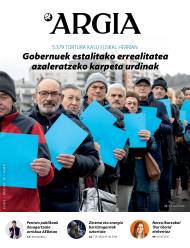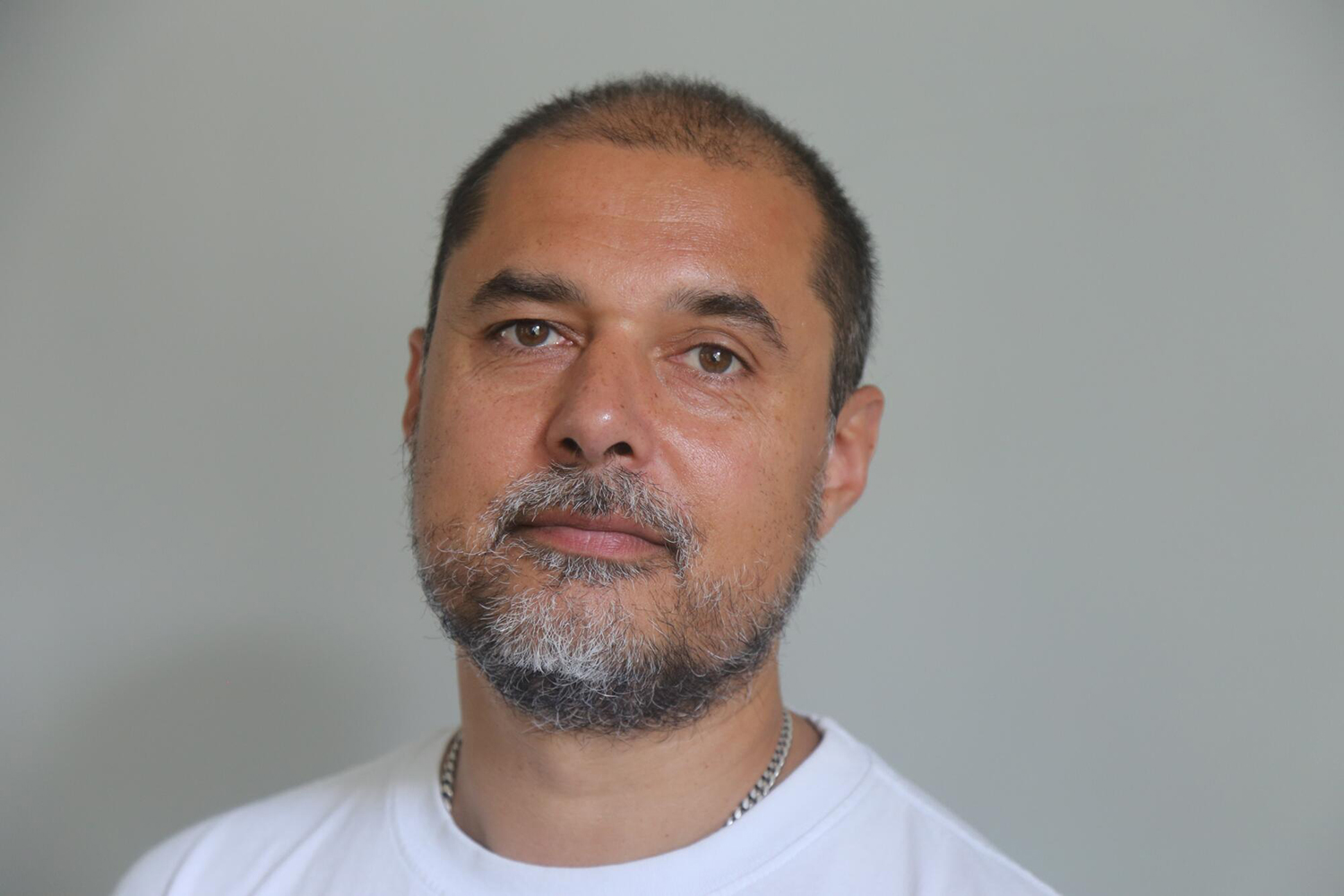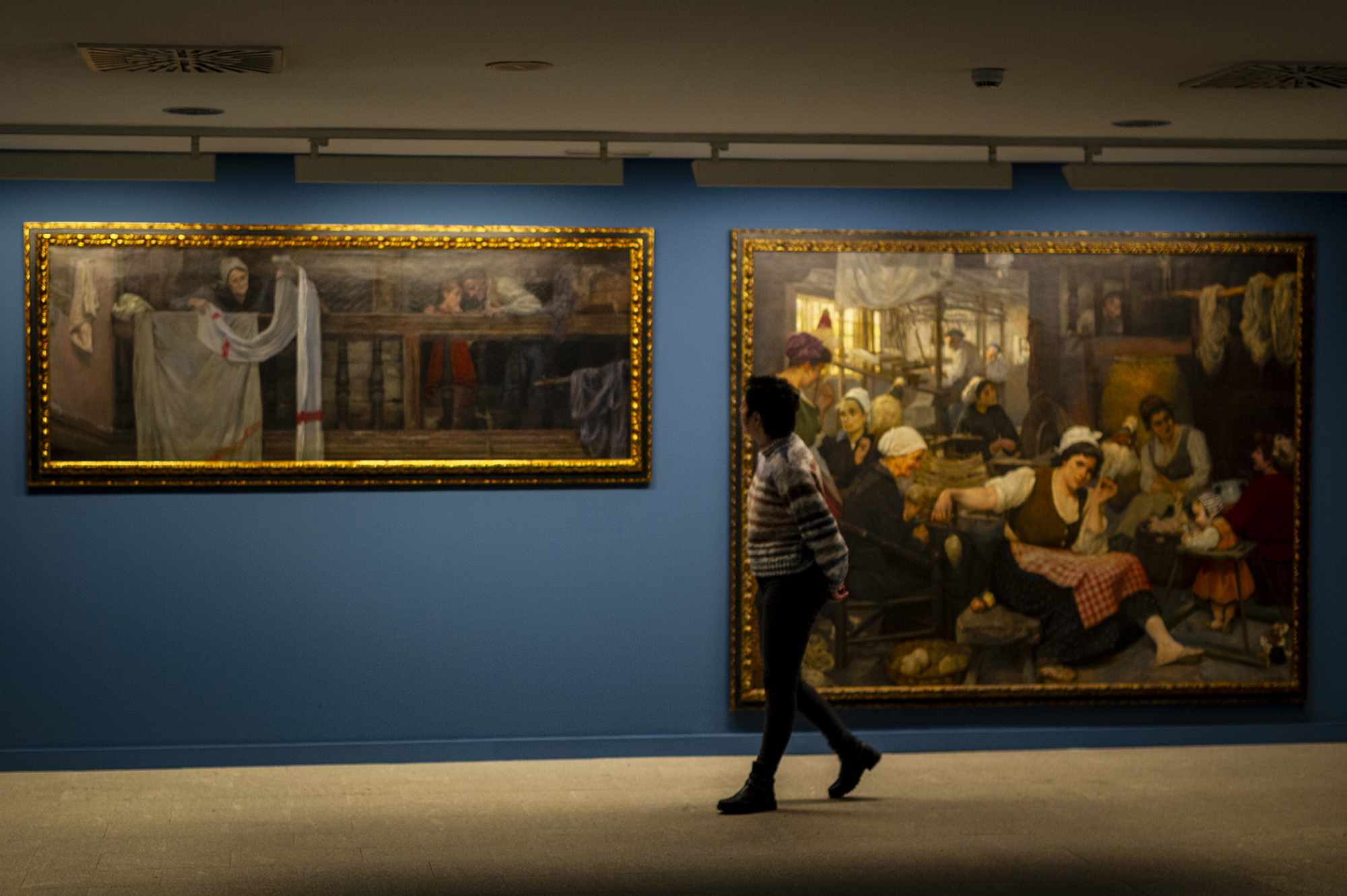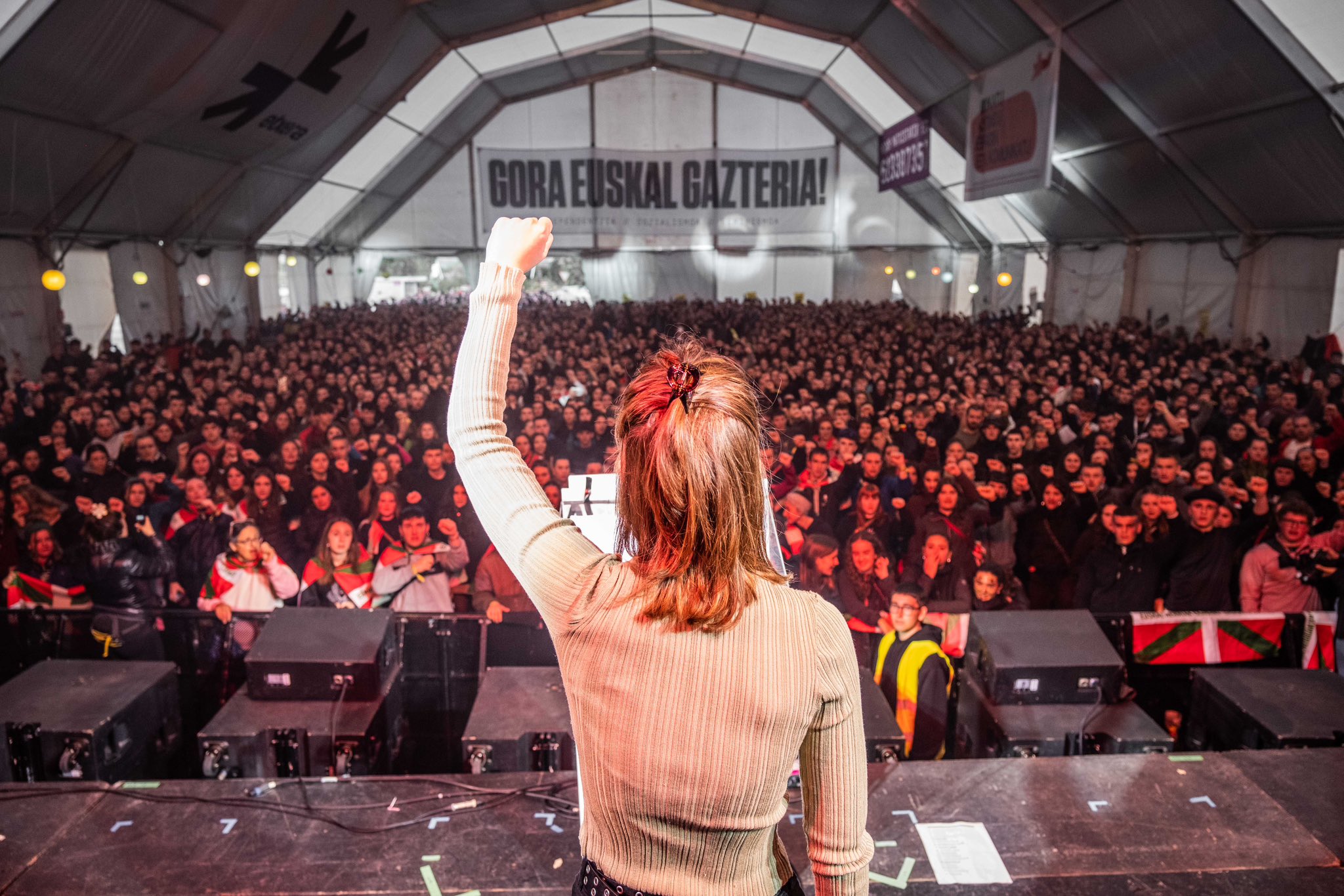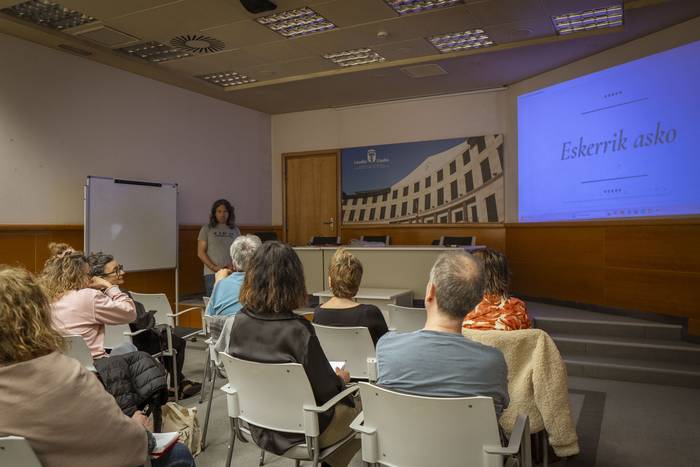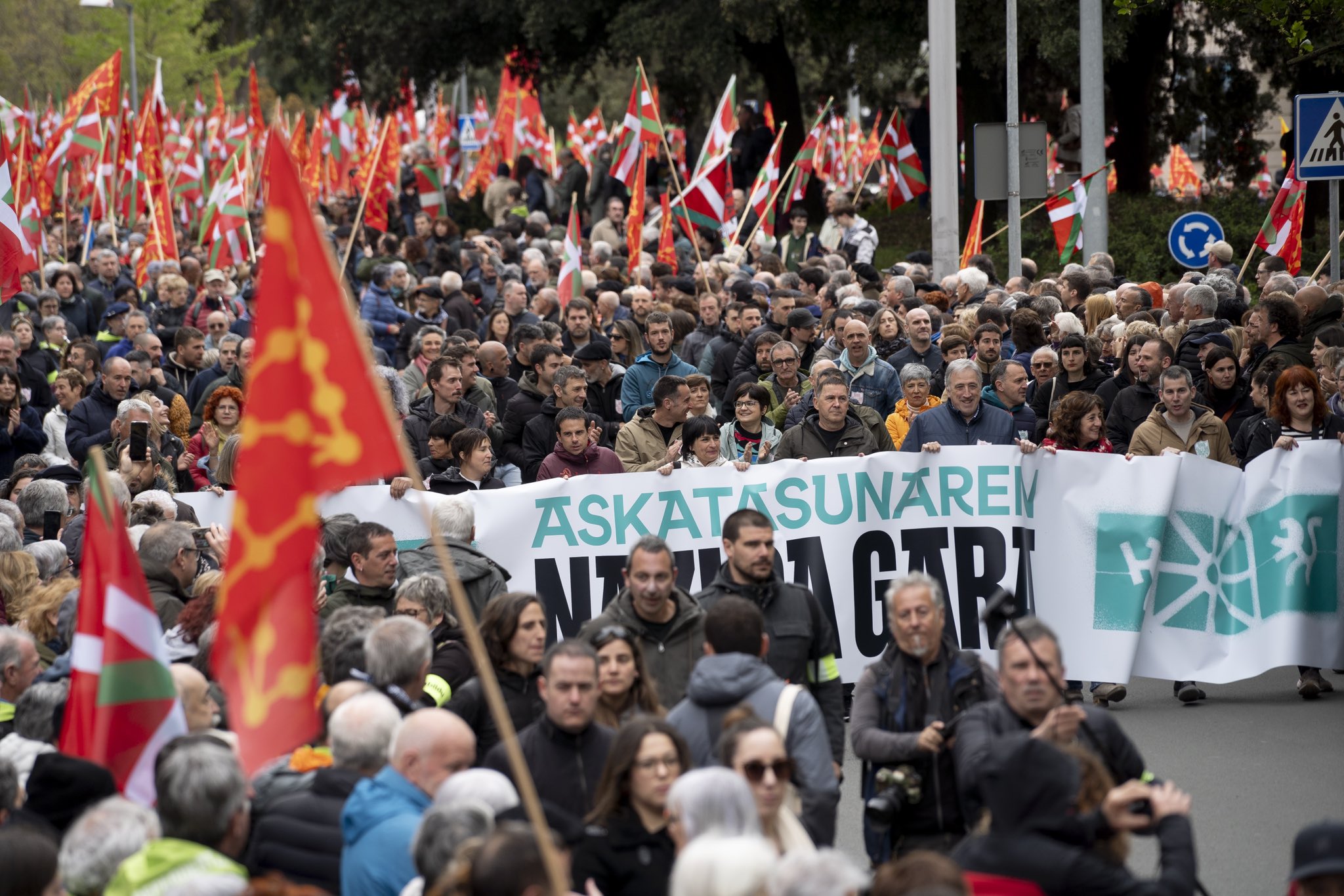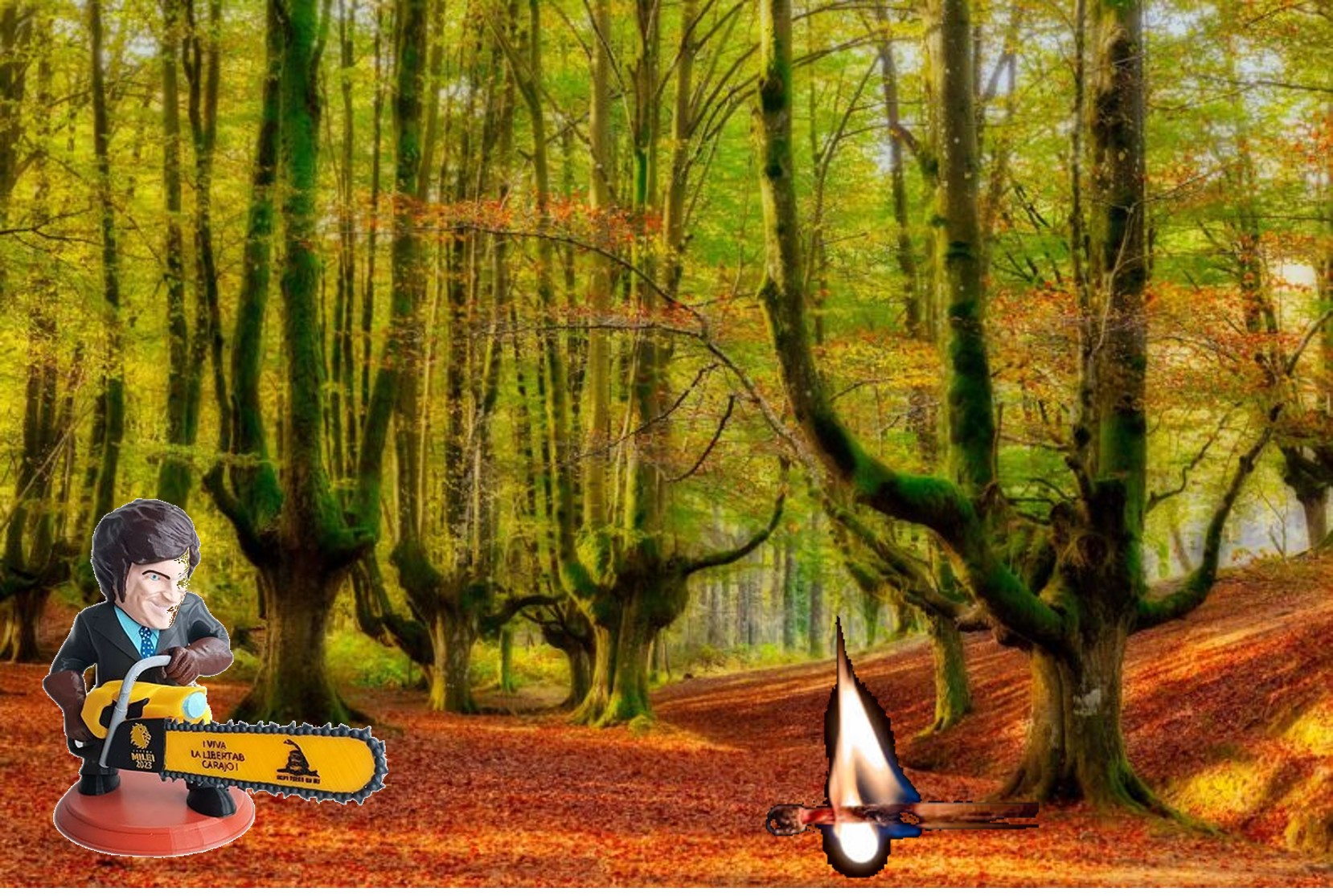"What is not possible for all people in the world is a privilege, not a right"
- The Euskaltegi Arturo Campion of Pamplona and the Traperos of Emmaus of Navarra have been 50 years old, and in both cases Luzio Tabar, first in the Euskaltegi and now with the traperos. In both cases there are many common characteristics: both popular initiatives, created to respond to a social need and both focus on people. Respect and kindness for all are the starting points.

Lucio Tabar Purroy. Ochagavía, 1960
He was part of the anti-militarist movement KEM-MOC in his youth and launched the Solar Radio, one of those restless young people. He was a professor of the Basque Country Arturo Campion for 20 years and has been working for some time now in the Traperos of Emmaus. He is a Bachelor of Journalism from the University of Navarra.
Was he born in Ochagavía and how long did he stay in town? I had the opportunity to study in the village until I was
14 years old to come to Pamplona. A school was created for the entire valley in Ochagavía, outside the public school, to be able to perform high school there. The mathematics teacher was a school teacher, the music teacher was an organist of the village, a priest gave Latin and another gave religion, our father was a village veterinarian and gave physics and chemistry. It was a popular initiative, but it was open to the whole valley. Then I came to the city, to Maristas, and then I studied journalism at Opus University. In the last year I started as a professor in the Basque Country, Arturo Campion.
And when did he learn Basque? When I was 15, I went to a
conference of José Miel Barandiaran and the girl next door asked me if I wanted to study Basque. He told me that if I got the group and the place, he would look for the professor. In the marists a friendly fraile left us a small room and with her brother we began to learn Basque. The next course I went to Euskaltegi Arturo Campion and there I studied while studying journalism.
In the last year of the studies, I was a Euskaltegi student at the upper level, and at the same time, I started teaching the first. At that time, German Sagrario took the lead and then Arturo Campion went from the night school to Euskaltegi. From the didactic point of view, we gave so many jumps, we extended the day and started to relate to those who taught in other places, creating some coordination. AEK was not yet, at least here.
He was in motion KEM-MOC. It was the time of pre-submission, right? Yes. The first ones we opposed to military service were automatically given the extension and when they got the new
law they were giving us an amnesty. We knew that the state was going to organise alternative social services to military service and that to do so we did not need any state, we set up a school workshop in Chantrea, in Burdintoki. The Traperos of Emmaus gave us the money to start it and the neighborhood retirees taught their trade to the young people who wanted to work. Now everyone says that this school was the model for the school workshops that the Government of Navarra subsequently created.
Nothing else to hear the word entrepreneur comes to mind the person who wants to set up his business and make money. What we were doing – Burdintoki, Arturo Campion, Traperos de Emmaus… – was not our own business to earn money, but to respond to a social need we saw. In this sense I see a great similarity between Campion and Emmaus. We were entrepreneurs, no doubt.
"Claiming is to be a progre without doing anything else. But what's the difference between a right and a progre?"
Demand and practical work, are both essential? That is true, but today it is observed that in most social areas there are movements totally linked to the claim and others that work exclusively in daily life. The exceptions
are very few: the scope of the Basque country or the work carried out with refugees and evicted people, because in both cases the demand and the daily work do go together. For example, food banks collect food, but there is no claim there. Anti-militarism, for its part, limits its role to demands. Some practical initiatives have been linked to charity and church, and the Reds were simply claiming them. I think that is a serious mistake. We must try to respond to people's problems in a practical way and at the same time make it clear what needs to be changed so that no more cases of this kind can occur. Claiming is to be a progre without doing anything else. But what's the difference between a right and a progre? We work in similar places, we charge a similar salary, we go on vacation to similar places, we have similar cars -- the way of living is not very different and that's falsehood. I'm not saying it's people's fault, but we're often unaware of how capitalism hooks us up.
.jpg)
Are you Emmaus’s demands? Low level. We never resorted to confrontation. That is very clear to us. To a
large extent our claim is testimonial, demonstrating in practice that things can be done in a very different way. Here, today we are 300 people. We have equal pay. Managers and the last employee who joins pay the same time. We want to claim that we all have the same responsibility: to do our best. In Campion we also had equal pay.
Working less so that we can all work. You have always been in favour of division of labour. Yes. In the last ten years, we've been
100 more people in the traperos. The number of colleagues increases year after year. And now we have proposed reducing working hours so that we can count on more people: we all work 32 and a half hours for a gross salary of EUR 1,100, at fourteen pay. Is it enough to live? Maybe not. In Navarre the average wage is over EUR 2,500, but here the barbarity is not our low wage, but the standard of living of society. What is not possible for all people in the world is a privilege, not a right. Having a holiday yes, but going on holiday is not a right, for example. Furthermore, do we talk a lot about rights and obligations? Many of
our colleagues have to look for complementary jobs outside here, but here as important as Emmaus money is being part of the team, relationship, respect and kindness.
Do many of you here know about abuse? We're almost
300 people from 34 countries. 70% have special problems because they are migrants, because they are in jail, because of drug problems or because they belong to unstructured families. Contrary to what some people think, here we have fewer problems than in any workshop, because these people are not used to being normal, that is, when you treat them well, they automatically get into that good environment. In addition, the capacity of people is worked on and increased if an appropriate environment is created. It surprises everyone's positive response.
You are celebrating the 50th anniversary of the Emmaus traperos. How did it start? It is an initiative created by the French friar Abbé Pierre. He was a good family, fought the
Nazis and at the end of the Second World War he was elected a parliamentarian. With the money he earned, he took a house to bring together the young people of France and Germany and started to remake relations between the countries, but it occurred to him to go to a man who wanted to commit suicide and proposed to accompany other people who, like him, were in a poor state. So they started moving the unemployed into this house, creating the first community. When he stopped being a parliamentarian, they ran out of money, and then they started collecting the waste that people threw out to sell.
In Navarre, before 1972 some Portuguese gypsies lived in slums in Barañáin, and a group of the ecclesiastical environment thought that a solution was needed. As they already had the reference of Emmaus in France, they decided to collect the soso in Pamplona. Things were picked up and put for sale in the English Court, where they pulled out a million pesetas. They created the village of Saint Lucia.
Some of those who lived there today are our partners. This collection and sale was maintained around the church until one of the current directors, José María García Breso, arrived in 1978. He came from Emmaus in Bilbao and wanted to create a community here. They contacted the volunteers and established the community in Villa Simona. They got a small truck and started to live selling the things they picked up.
Shortly afterwards, the City of Pamplona commissioned a group called Lorea to organize the first selective collection of garbage. The Lorea contacted the traperos and both started the service in 1982. The first state collection of this kind was carried out in the Ermitagaña neighborhood. Normally the communities of Emmaus do not work with the administration, but here we do have service contracts with various maneuvers and we collect at home furniture and voluminous objects, we collect and repair appliances, clothing and shoes… We also collect every night voluminous objects deposited by the trash and thus clean the city. Navarre is a pioneer in this.
What about the community?
It is located in the town of Belzunze, where 25 people live. It's the heart of Emmaus, the seed, where it all started. Its goal is to be a school for team and people development.
"And now we have proposed reducing working hours so that we can count on more people: we all work 32 and a half hours for a gross salary of EUR 1,100, at fourteen pay"
You propose a circular economy. Yes, but the circular
economy really isn't circular, it's always a downward spiral, because every time you use one thing you lose something. I suspect that the circular economy, like sustainable development, will become an empty slogan for everything to remain the same. The authorities have no intention of changing, but we citizens are also not prepared to take the necessary steps to solve all these problems such as climate change, pollution or biodiversity loss. Deceleration is mandatory. In 2022, we collected almost three million kilos of textiles and footwear. 3,000 tonnes. More than ten tons daily in Navarra. The worst thing is not to collect all that, the worst thing is that in order to collect it you buy ten tons of clothes each day, and we know that ten tons of clothes are produced, where and how, and so far bring it by boat, in trucks… And that only in Navarra. It's an absolute nonsense. This will not stop until it explodes.
.jpg)
Few possibilities for optimism? I see it like this. I believe that everyone is in the process of becoming a third world. The gap between the poor and the rich has
been a feature of the third world, but in our case we have more and more cracks. The second step was the pandemic. We didn't think that could happen to us, but it came. And the third step is war. Wars were distant, but now we have them in Europe. And if you add to this climate change, the energy crisis, the depletion of raw materials, the loss of biodiversity -- will the next ones live worse? Materially yes, I have no doubt. Happier and more balanced?
There's a writer and philosopher that I love, Jorge Riechmann, who says it's a question if in this 21st century 50, 80 or 100 percent of the world's population will die. For young children, don't think better. I am not optimistic, but I think we need to make progress every day. I live to death and hope that the reaction will ever come. Small communities will be strengthened so that they can continue to live. The community spaces created will have the greatest opportunity to face the black future, these neighborhood concept neighborhoods, communities like ours...
Can
the Basque be a backer? Yes, because Euskera creates community. I believe that Euskera will have a promising future because it is a link for the community. If we want those who come to love the Basque country, they will first have to love the Basques. We have to deal with them.
"Some say that migrants are a danger to Euskera. I think those who do not want to learn Basque are much more dangerous”
Some say that migrants are a danger to Euskera. I find those who do not want to learn Euskera much more dangerous. On the other hand, they can be a risk if we do not work enough. What relationship do you have with migrants? What community do you enter with them to get them into us? Asking is free, but it's easier to give it. And furthermore, it is up to us to give ourselves in advance, because we have everything and they have nothing. There
are very few rights without obligations and we are used to claiming everything as a right.
What is your attitude towards Euskera among those who come from outside? If in their countries of origin they are used to using different languages, it is normal for them to listen to the Basque language. On the contrary, the people of Central and South America have a
strong adherence to Spanish, they see with contempt the local languages in general and do not understand how, being Spanish, we can speak in Basque. It is normal and natural for one to hear the Basque, because among the Basques we always work in Basque. Most have not learned Basque, but I know that the children of many of our colleagues are learning in model D.
Kondenatutako atzerritarren nazionalitateari buruzko datuak argitaratuko dituela adierazi du Erresuma Batuko Barne ministroak. Bide beretik, pasa den astean ezagutarazi zen Aste Nagusian atxilotutako 79 pertsonaren argazkiak filtratu zituela Ertzaintzak.
Militante eta ikerlari antiarrazistak abiapuntu argia adierazten du: arrazakeriaren aurka borrokatzea ez da zeregin psikologiko edo diskurtsibo bat, baizik eta egiturak desegiteko premia.
EAEko Auzitegi Nagusiak agindu ostean eskola kirolaren aurkako epaia berehala betetzeko, Gipuzkoako Diputazioak jakinarazi du erabakia "onartu eta errespetatu" egingo duela, helegiterik ez duela aurkeztuko, eta aurrez Espainiako Auzitegi Gorenean jarritako kasazio... [+]
You may not know who Donald Berwick is, or why I mention him in the title of the article. The same is true, it is evident, for most of those who are participating in the current Health Pact. They don’t know what Berwick’s Triple Objective is, much less the Quadruple... [+]
The article La motosierra puede ser tentadora, written in recent days by the lawyer Larraitz Ugarte, has played an important role in a wide sector. It puts on the table some common situations within the public administration, including inefficiency, lack of responsibility and... [+]
Is it important to use a language correctly? To what extent is it so necessary to master grammar or to have a broad vocabulary? I’ve always heard the importance of language, but after thinking about it, I came to a conclusion. Thinking often involves this; reaching some... [+]
Many Basque feminists have been disappointed to learn that writer Chimamanda Ngozi Adichie has externalized pregnancy, meaning that a surrogate has fertilized her baby for money.Adichie is the author of the essay We should all be feminists, among others. They have ignored the... [+]









